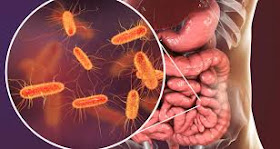I have a sensitive stomach, and ever since my stroke, more sensitive, which I didn't think was possible. With the holiday season upon us, I wanted to know WHY! In other words, is there a connection between stroke and gut?
Harvard researchers found stomach problems could be linked to after-stroke stress. In fact, the gastrointestinal (GI) tract is sensitive to anxiety, anger, depression, and sadness, too (all of which I've had post-stroke), and it can trigger symptoms in the gut. Therefore, the brain reflects what the GI system feels. Stress is the worst, the researchers concluded. (Fun fact: I used to consider giving a stressful TED talk about stroke; I'm not anymore).
A study involving mice, published this week in Nature Medicine, argues that striking the correct microbial balance could prompt changes in the immune system that would be likely to reduce brain damage after a stroke.
Researchers at Weill Cornell Medical College and Memorial Sloan Kettering Cancer Center wanted to find out whether they could shift the balance of these cells to favor beneficial cells by meddling with the mouse bacteria.
So one group’s intestinal makeup was resistant to antibiotics and the other group bacteria was susceptible to treatment. When the latter group was given a combination of antibiotics over the course of two weeks, the microbes underwent change. Then the researchers obstructed the cerebral arteries, inducing an ischemic stroke [the most common type of stroke]. They discovered that the resultant brain damage was 60 percent smaller in the drug-susceptible mice.
Finally and painstakingly, the researchers took the colons of mice that had ischemic stroke and transplanted to new mice with no antibiotics, thus establishing a group with finagled gut bacteria but no drug exposure, and discovering that these mice had also acquired protection against stroke.
“These cells determine what kind of inflammatory immune response the brain is going to experience after stroke,” says neurologist Constantino Iadecola, director of the Brain and Mind Research Institute at Weill Cornell and one of the study’s authors. “Immune cells end up helping out instead of contributing to the damage that occurs."
A mouse’s genetic material is quite different from that of a human, and researchers will need clinical data, but at least they're trying.
"This is just the beginning,” says Ulrich Dirnagl, a neurologist at the Center for Stroke Research Berlin who read the results. “The study links the microbiota and the immune system and the brain in stroke—an acute brain disorder—in one story. That’s really novel."
That it is, Dr. Dirnagl. That it is.
Harvard researchers found stomach problems could be linked to after-stroke stress. In fact, the gastrointestinal (GI) tract is sensitive to anxiety, anger, depression, and sadness, too (all of which I've had post-stroke), and it can trigger symptoms in the gut. Therefore, the brain reflects what the GI system feels. Stress is the worst, the researchers concluded. (Fun fact: I used to consider giving a stressful TED talk about stroke; I'm not anymore).
In an article called "A Hidden Factor in Stroke Severity: The Microbes in Your Gut" by Jordana Cepelewicz, she talks about a new study in mice which demonstrates that manipulating the microbiome [the genetic material of all the microbes - bacteria, fungi, protozoa and viruses - that live on and inside the human body] can influence the extent of brain damage caused by a stroke.
Researchers at Weill Cornell Medical College and Memorial Sloan Kettering Cancer Center wanted to find out whether they could shift the balance of these cells to favor beneficial cells by meddling with the mouse bacteria.
So one group’s intestinal makeup was resistant to antibiotics and the other group bacteria was susceptible to treatment. When the latter group was given a combination of antibiotics over the course of two weeks, the microbes underwent change. Then the researchers obstructed the cerebral arteries, inducing an ischemic stroke [the most common type of stroke]. They discovered that the resultant brain damage was 60 percent smaller in the drug-susceptible mice.
Finally and painstakingly, the researchers took the colons of mice that had ischemic stroke and transplanted to new mice with no antibiotics, thus establishing a group with finagled gut bacteria but no drug exposure, and discovering that these mice had also acquired protection against stroke.
“These cells determine what kind of inflammatory immune response the brain is going to experience after stroke,” says neurologist Constantino Iadecola, director of the Brain and Mind Research Institute at Weill Cornell and one of the study’s authors. “Immune cells end up helping out instead of contributing to the damage that occurs."
A mouse’s genetic material is quite different from that of a human, and researchers will need clinical data, but at least they're trying.
"This is just the beginning,” says Ulrich Dirnagl, a neurologist at the Center for Stroke Research Berlin who read the results. “The study links the microbiota and the immune system and the brain in stroke—an acute brain disorder—in one story. That’s really novel."
That it is, Dr. Dirnagl. That it is.




No comments:
Post a Comment